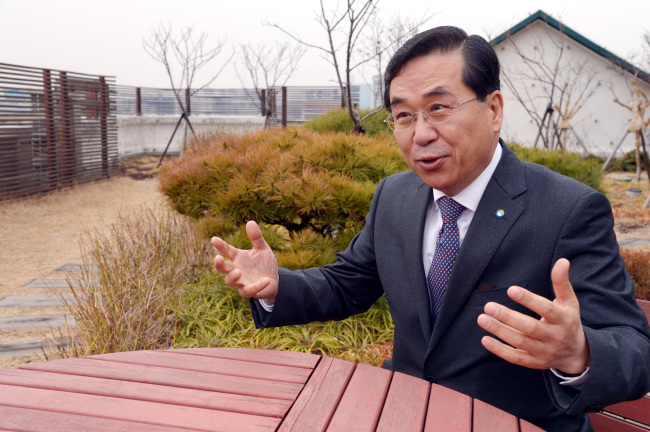Despite the government’s efforts to improve water management through advanced technology, South Korea faces severe water shortage problems.
The U.S.-based Population Action International lists Korea as a water-stressed country, with water availability per capita at 1,472 cubic meters in 1995, and projected to be 1,327 cubic meters by 2025. Countries with a yearly water supply of 1,000 to 2,000 cubic meters per person are considered water-stressed.
Amid concerns over Korea’s water resources, the head of Korea’s state-run environment body stressed that going back to the basics is the key to overcoming this problem.
“Expanding water reuse and reducing the leakages are the most realistic solutions,” Korea Environment Corporation CEO Lee Si-jin told The Korea Herald.
 |
Korea Environment Corporation CEO Lee Si-jin. (Chung Hee-cho/The Korea Herald) |
“Some claim that developing new water resources can relieve the shortage problem. But considering its high cost, ecological problems and possible conflicts with concerned regions, that’s not viable.”
KECO has committed to sustainable growth by connecting the public and private sectors in water management and greenhouse gas emission reductions. Lee, who has been a consultant to KECO and the Environment Ministry for over two decades, took the helm of the company in 2013.
Lee stressed that three factors affect Korea’s water use: the limited amount of water, resource waste and the limit of developing water resources.
“If we at least reuse a certain amount of water spent at households and industrial facilities, the water shortage problem can be greatly solved,” Lee said.
Water reuse includes purifying and treating rainwater, sewage and effluent into industrial and agricultural water, he added.
The government is considering a long-term scheme to reuse 2.5 billion tons of water or 12 percent of the total water resource by 2020 based on KECO’s study.
“Along with efforts to widen the water reuse, water leakage management should be carried out to conserve resources,” 58-year-old Lee said.
As of 2013, Korea recorded 650 million cubic meters of water leakage per year, worth 515 billion won ($470 million), the CEO added.
As part of its efforts to minimize the leakage, KECO has launched a special water management project in two regions in Gangwon Province since 2009. This includes improving the waterworks pipes and running a real-time management system.
While the project is still underway, the leakage rate in Yeongwol-gun and Jeongseon-gun in the province already dropped by about 10 percent to 37.1 percent, and by 3 percent to 80 percent, respectively, he said.
In recognition of its works in water management and other environmental projects, KECO won the Environmental Business International Award for the last four years and Green Apple Awards three years straight.
As part of further efforts to find solutions for water issues, KECO is participating in the seventh World Water Forum, the world’s largest water event that kicked off Sunday in Daegu and North Gyeongsang Province, in southern Korea.
The state-run company will host the World Water Challenge to award those who come up with the most feasible and innovative water solutions.
“Countries around the world have participated in the challenge. I’m looking forward to seeing water solutions through creative ideas in the challenge,” Lee said.
By Lee Hyun-jeong (
rene@heraldcorp.com)




![[Today’s K-pop] Blackpink’s Jennie, Lisa invited to Coachella as solo acts](http://res.heraldm.com/phpwas/restmb_idxmake.php?idx=644&simg=/content/image/2024/11/21/20241121050099_0.jpg)



